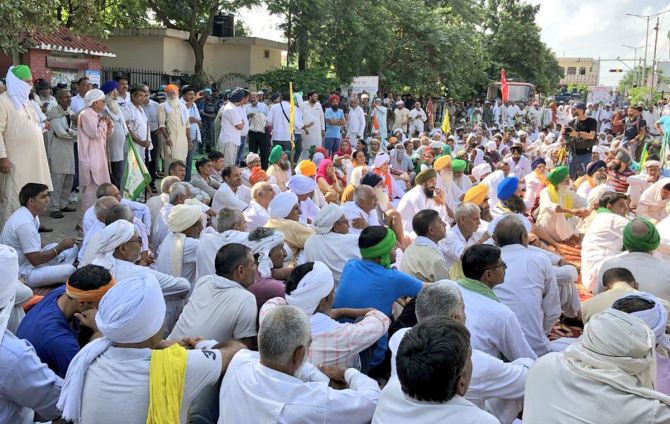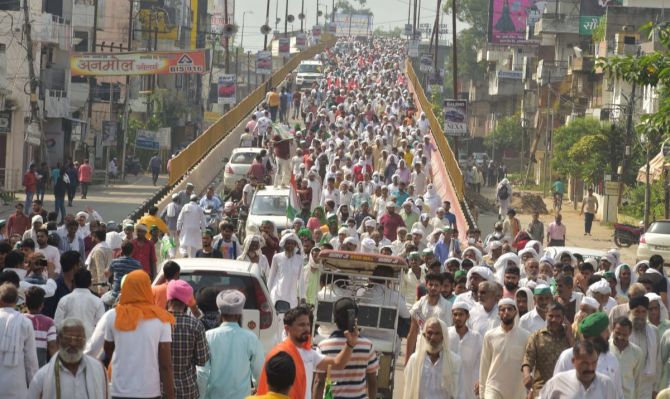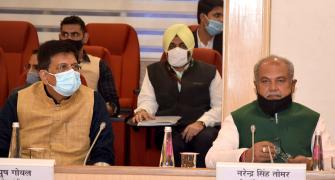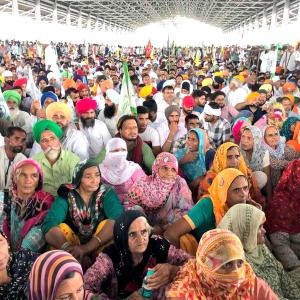Extended rounds of negotiations having failed, farm leaders now reckon that their best chance to pressure the government lay in defeating the BJP in the coming assembly poll, particularly in UP, observes Virendra Kapoor.

With an eye on the next year's assembly poll in UP and other states, the agitating farm leaders have stepped up the protest.
Launched in August last year to demand the repeal of the three agriculture reform measures, in the last few months only a handful of farmers had camped at the temporary homes built smack in the middle of the highways leading into the national capital from Haryana and Punjab.
The authorities paid little heed, while millions of commuters got used to the daily inconvenience, taking a detour to skirt around the blockages.
The Supreme Court, which on a PIL had prescribed that the anti-CAA protesters had no right to block the public thoroughfares, on a similar petition pertaining to the blockage of roads by the farmers was yet to pronounce its verdict.
The authorities too did not seem to be in any hurry to move the air-conditioned tents of the protesting farmers obstructing the free flow of highway traffic.
Extended rounds of negotiations in the first few weeks of the agitation having failed, the farm leaders now reckon that their best chance to pressure the government lay in defeating the BJP in the coming assembly poll, particularly in UP.
Though Punjab too will elect a new assembly year, the stakes for the saffron party are virtually negligible.
Ironically, the prosperous Sikh farmers had taken the lead in launching the agitation, but the focus has shifted to the farmers from western UP.
Rakesh Tikait and his small band of activists from the Jat belt now provide the real heft to the protest.
The September 5th rally in Muzaffarnagar in western UP, was Tikait's show of strength. About one lakh people attended. There was a sizable presence of Muslims in the audience. A clarion call was given to defeat the BJP in the coming assembly poll.
Aside from the repeal of the three farm reforms, demand for a legally guaranteed procurement of food grains at minimum support price was raised at the meeting.
Conscious of the sharp communal polarisation which had helped the BJP in the last Lok Sabha and assembly polls to win nearly three-fourths of the seats in western UP, Tikait stressed the need for Hindu-Muslim unity.
With 130-odd assembly seats in western UP, should the Jats, the dominant farming caste in the region, and Muslims join hands, the BJP admittedly would find it hard to repeat its previous success.

But these may be early days yet. The BJP is unlikely to give up so easily. Indeed, it may have quite a few cards up its sleeve.
For one, the divide between the relatively prosperous land-owning Jats in western UP, and the small and medium farmers and share-croppers is deeply entrenched.
It lies in socio-economic factors. The small and marginal tillers and share-croppers cannot be upset with the reforms which by ensuring remunerative prices for their produce and better wages for the farm labour, in fact, seek to benefit them immensely, breaking the stranglehold of the big zamindars.
As the latest survey of rural households confirmed, a mere 0.4 percent farmers own ten hectares or more land.
It is they who are in the forefront of the anti-reform protest.
According to the same survey, seventy percent of the rural households own one hectare or less.
They cannot have anything to do with the farm protest.
Which explains why despite more than a year-old stir it has failed to attract farmers from other parts of UP.
And despite attempts by the Opposition no other state has joined the protests.
Prosperous Punjab farmers alone feel aggrieved, encouraged no doubt by the Congress party-led state government.
Again, opportunistic attempts to wish away the endemic Hindu-Muslim divide may not succeed. The emotional scars inflicted by the violent clashes a few years ago and the resulting communal polarisation cannot be healed by Tikait's call for them to forge a common platform.

Significantly, the central government has also declared new minimum support price for various crops ahead of time with an eye on the farm agitation.
There is a clear attempt to wean the farmer away from the staple wheat and paddy crops in Punjab.
The paltry Rs 40 increase in the MSP of wheat is a sensible decision given that the FCI godowns are chockfull despite liberal distribution of free food grains during the pandemic.
Nearly six million tonnes of wheat and over four million tonnes of rice are in stock.
Despite the farm agitation a record procurement of wheat and rice took place in Punjab last season.
Also, the same reforms for the first time enabled payment for the procured food grains to be made directly into the farmers' accounts, cutting out the 'Arthiyas' and other intermediaries.
Farmers grudgingly appreciated the direct and prompt payment, but still shied away from acknowledging the benefit of reforms.
Helping micro and small farmers to get an equitable price for their produce is one of the major benefits of opening up the farm sector.
Shackled by vested interests in various Agriculture Produce Market Committees, rich farmers have become a pawn in their hands, protesting against farm-friendly laws aimed at rationalizing and modernising Indian agriculture for optimum growth and prosperity.
Admittedly, such reforms done incrementally could have helped diminish resistance, but nonetheless almost all agri sector specialists are unanimous that these were long overdue.
Feature Presentation: Aslam Hunani/Rediff.com










